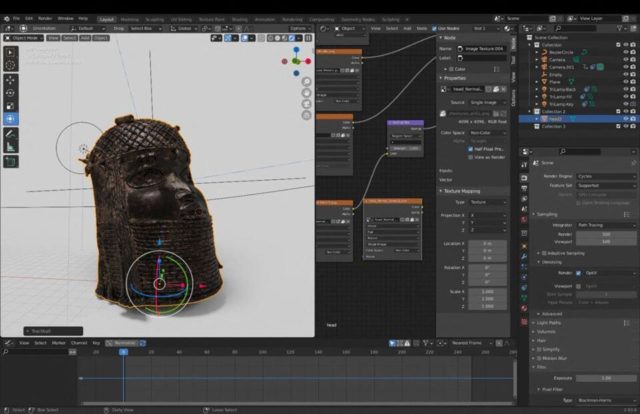A Nigerian man has launched a project called ’Looty’ to reclaim African artefacts stolen by European colonisers by creating 3-D images of them, selling them as non-fungible tokens (NFTs) and using the proceeds to fund young African artists.
By Angela Ukomadu and Estelle Shirbon
LAGOS – A Nigerian man has launched a project called “Looty” to reclaim African artefacts stolen by European colonisers by creating 3-D images of them, selling them as non-fungible tokens (NFTs) and using the proceeds to fund young African artists.
Calls for objects stolen during the colonial period to be returned to their places of origin have intensified in recent years, and Western institutions have sent items back to countries including Nigeria and Benin.
Chidi Nwaubani, the founder of Looty, described his project as an alternative form of repatriation, by which digital technologies are used to reclaim a measure of control and ownership over artefacts still held far from Africa.
“Imagine a world where these items were never looted,” Nwaubani told Reuters in an interview. “We’re just trying to re-imagine that world and bring that world into the digital form.”
The process begins with what Nwaubani called a “digital art heist”, a perfectly legal procedure in which a Looty team member goes to a museum and scans a target object using technology that can be used to create a 3-D image.
An NFT of the image is created and put up for sale via the Looty website, which also acts as an online gallery where anyone can view the images for free. Nwaubani said 20% of the proceeds of NFT sales would go towards grants for African artists aged 25 or under.
NFTs are a type of digital asset that allows anyone to verify who owns them.
The website launched on May 13 and although there were no immediate sales, Nwaubani has received messages of interest from around the world.
Looty’s first NFTs are based on an image of one of the Benin Bronzes that were looted by British troops in 1897 from what is now Nigeria and are held in the British Museum in London.
“Knowing that it’s Nigerian but it lives outside of Nigeria has always troubled me. So I felt that there’s something that we could do to change that,” said Nwaubani.
Looty’s next big project is focused on an Ancient Egyptian item, Nwaubani said, declining to give further details.
The name Looty refers to the act of looting and is also a playful homage to the dog Looty, which was found by a British captain after troops looted the Summer Palace near Beijing in 1860, taken back to London and presented to Queen Victoria.
– REUTERS








